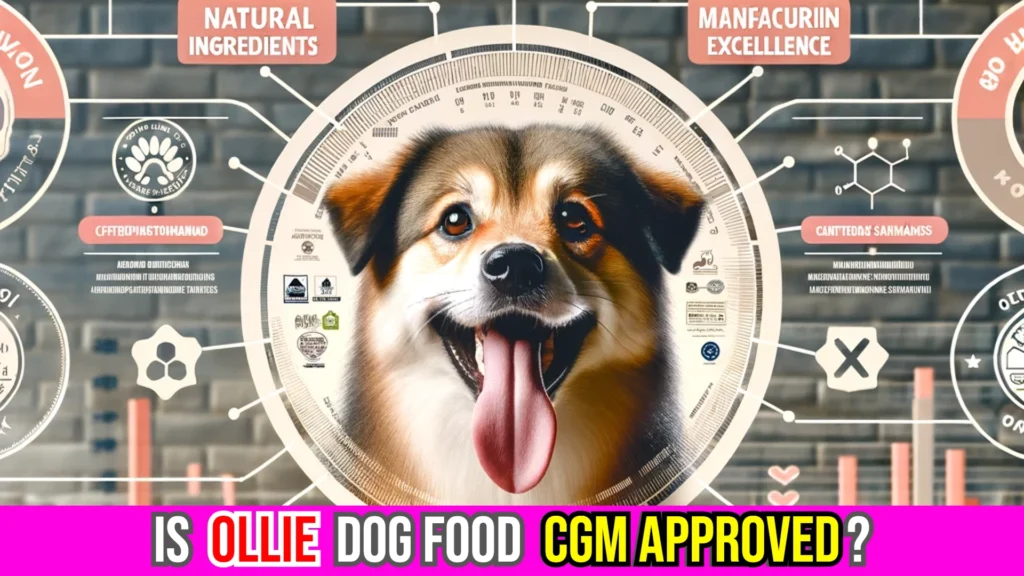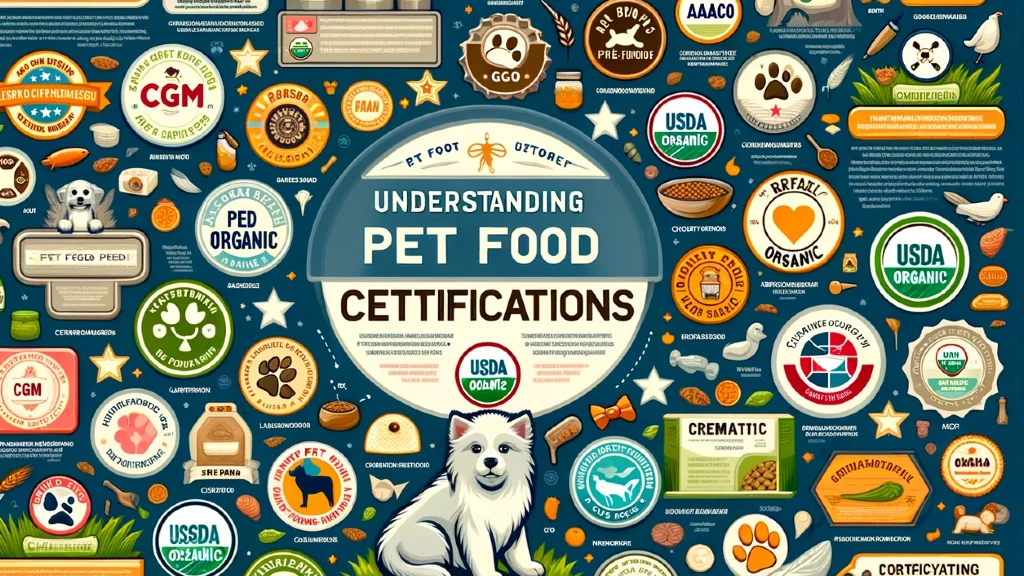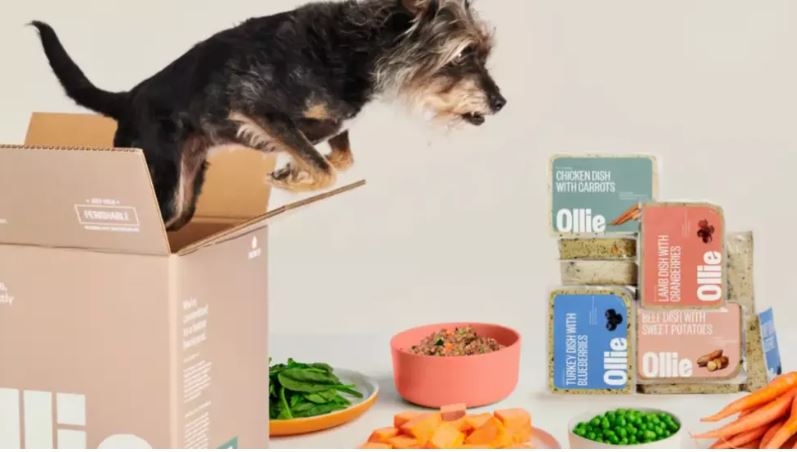In an era where pet health and nutrition are paramount, discerning pet owners are increasingly vigilant about the quality and certifications of the food they feed their furry companions.
Among the myriad of choices available, Ollie Dog Food has emerged as a popular choice for its commitment to natural ingredients and tailored meal plans.
However, a crucial question that surfaces among conscientious pet owners is, “Is Ollie Dog Food CGM Approved?”
This blog post delves into this query, unraveling the layers of pet food certification and what it means for your beloved pet’s health and well-being.
Is Ollie Dog Food CGM Approved?

To address the question head-on: As of the current standards and public information available, Ollie Dog Food is not officially CGM (Certified Good Manufacturing) approved. However, this does not diminish its quality or nutritional value.
Ollie Dog Food adheres to high manufacturing standards and prioritizes natural, wholesome ingredients in its recipes.
The absence of CGM approval speaks more to the specialized and varying nature of pet food certifications rather than a deficit in Ollie’s quality or nutritional standards.
Understanding Pet Food Certifications:

What Does CGM Approval Entail?
CGM (Certified Good Manufacturing) approval is a certification that focuses on the quality and consistency of production processes in the pet food industry.
It involves rigorous checks of the manufacturing facilities, equipment cleanliness, employee training, and the processes used in creating the pet food.
This certification ensures that a product is made with the utmost care and consistent quality, meeting predefined safety and quality standards.
Other Significant Certifications in Pet Food Industry
- AAFCO Standards: The Association of American Feed Control Officials sets guidelines for nutritional adequacy, ingredient definitions, and product labeling.
- USDA Organic: This certification ensures that ingredients are free from pesticides, synthetic fertilizers, and genetically modified organisms (GMOs).
- Non-GMO Certification: Indicates that the product does not contain genetically modified ingredients.
- Natural and Holistic Labels: Though less regulated, these terms suggest the use of less-processed ingredients.
Ollie Dog Food: Ingredients, Sourcing, and Manufacturing:

Key Ingredients and Their Nutritional Benefits
Ollie Dog Food typically includes high-quality proteins like chicken, beef, or lamb, essential for muscle development and maintenance.
Carbohydrates like sweet potatoes and peas provide energy, while ingredients rich in omega-3 and omega-6 fatty acids, such as fish oil, contribute to a healthy coat and skin.
Sourcing of Ingredients and Ethical Practices
Ollie emphasizes sourcing ingredients from reputable farms and suppliers who follow ethical practices. This includes ensuring that meat comes from facilities that treat animals humanely and that vegetables and fruits are organically grown whenever possible.
Manufacturing Process and Quality Control Measures
Ollie Dog Food is prepared in small batches to ensure quality control. The manufacturing process includes thorough testing for pathogens and contaminants to ensure safety and quality of the final product.
Comparative Analysis: Ollie Dog Food vs. CGM Approved Brands:
Nutritional Comparison
Ollie Dog Food stands out for its high-quality, human-grade ingredients. Its nutrient profiles are generally above average in protein and fat, while being below average in carbohydrates.
For instance, one of their turkey-based recipes shows a dry matter basis of 39% protein and 25% fat, with an estimated carbohydrate content of about 28%. In terms of ingredients, Ollie uses items like turkey breast, kale, lentils, and carrots, which are known for their nutritional benefits, such as essential amino acids, beta-carotene, and dietary fiber.
They also include elements like turkey liver for additional nutrients and chia seeds for omega-3 fatty acids.
Price and Accessibility
Regarding pricing, Ollie Dog Food’s cost varies depending on factors such as the dog’s size and the specific plan chosen (fresh, baked, or mixed). For a small, active dog (around 10 lbs), the cost can be approximately $4 per day for the fresh option and $2.50 per day for the baked option.
For a medium/large dog (around 50 lbs), these costs are around $8 and $5.20 per day, respectively. It’s important to note that while Ollie may be priced higher compared to some other dog foods, its focus on human-grade, nutritious ingredients justifies the cost for many pet owners.
Customer Satisfaction and Reviews
Customer feedback generally reflects satisfaction with Ollie Dog Food’s quality and the health benefits it offers, such as improved digestion and potential allergy relief.
Many pet owners have reported positive changes in their dogs’ health after switching to Ollie, including relief from food allergies and improved digestive health. The customizability of the meals to address specific dietary needs is also a noted advantage.
The Importance of Transparency in Pet Food Industry:

Regulatory Bodies and Standards
The Food and Drug Administration (FDA) and the Association of American Feed Control Officials (AAFCO) play crucial roles in the regulation and standard setting of the pet food industry.
The FDA is responsible for ensuring the safety and proper manufacturing of pet food, ensuring that it is free of harmful substances, produced under sanitary conditions, and truthfully labeled.
The FDA also oversees the pre-market review of animal drugs, but this does not extend to pet food unless the substance is a food additive.
The FDA Food Safety Modernization Act (FSMA) requires animal food facilities to create and implement a food safety plan, which includes hazard analysis and preventive controls to ensure food safety.
AAFCO, on the other hand, does not directly regulate, test, approve, or certify pet food. Instead, it plays a significant role in establishing model language for pet food regulations, which states and other governing bodies can adopt into law.
These model regulations cover various aspects of pet food, including ingredient definitions, labeling, and nutritional adequacy.
How Transparency Affects Consumer Choice
Transparency in pet food industry is pivotal in influencing consumer trust and decision-making. With the increasing availability of information, consumers are more inclined to scrutinize pet food products closely.
Factors like ingredient sourcing, manufacturing processes, and labeling greatly affect consumer choices.
When pet food companies are transparent about their ingredients and manufacturing processes, it builds consumer confidence and trust in the brand.
This demand for transparency is also reflected in the evolving pet food regulations and standards. For instance, AAFCO and FDA’s ongoing discussions on pet food safety and regulations emphasize modernizing pet food labels to resemble those of human food, making them more comprehensive and consumer-friendly.
The attention to details like nutritional adequacy, safe handling instructions, and ingredient lists reflects a shift towards greater transparency in the industry.
Moreover, the growing interest in specific ingredients like CBD and human-grade food certifications indicate a more discerning consumer base that values detailed and straightforward information about what they are feeding their pets.
Conclusion:
In conclusion, while Ollie Dog Food is not CGM approved, it stands as a testament to high-quality, nutritionally rich dog food tailored to meet the diverse needs of pets. Understanding pet food certifications and what they entail is crucial for making informed choices about your pet’s diet.
The absence of a specific certification like CGM doesn’t inherently diminish the quality of a dog food brand.
Instead, it highlights the varied landscape of pet food standards and the importance of evaluating each brand based on a holistic set of criteria, including ingredient quality, nutritional value, and manufacturing practices.
0 Comments